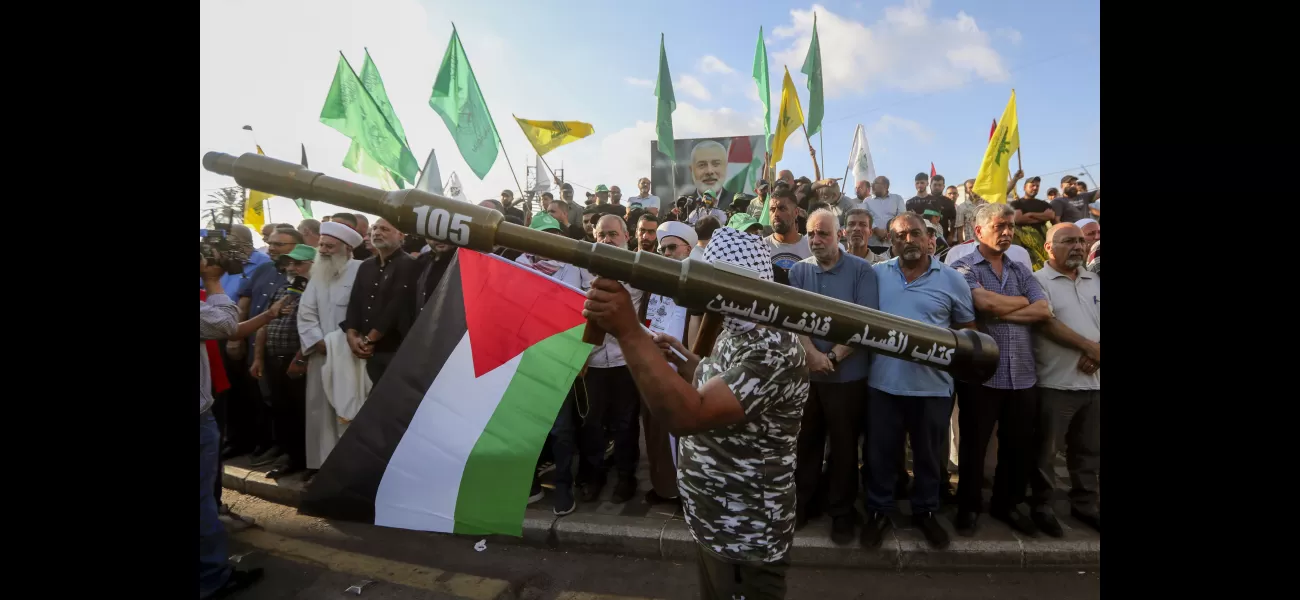Tensions rise as superpowers unite and fears of a major conflict escalate following the assassination of a Hamas leader.
There is concern about a possible Middle East war due to Iran's vow for revenge.
July 31st 2024.

The UN Security Council is currently in a state of emergency, as they have gathered to discuss the recent airstrikes that have taken place in the Middle East. These attacks, which occurred only hours apart, have resulted in the deaths of two militant leaders who were known for their anti-Israel stance. The fear of a potential regional war breaking out has caused great concern among leaders and diplomats around the world.
The two leaders who were killed were Ismail Haniyeh, the political chief of Hamas, and a top commander of Hezbollah in Lebanon. These unexpected assassinations have caused a diplomatic frenzy as countries try to navigate the mounting tensions in the region. Rosemary DiCarlo, the UN Undersecretary-General, expressed her concerns about the situation, calling for diplomatic efforts to prevent further escalation and find a path towards peace and stability.
Despite the urgency of the situation, it seems unlikely that the Security Council will be able to come to a unanimous decision on how to address the airstrikes. With both the United States, a strong ally of Israel, and Russia, a close ally of Iran, holding veto power in the council, reaching a joint message will be challenging.
The death of Ismail Haniyeh, who was killed in a predawn airstrike in Iran, has caused shock and outrage among his supporters. Iran and Hamas have both accused Israel of being behind the assassination and have promised revenge. Meanwhile, Israeli Prime Minister Benjamin Netanyahu has remained silent on the matter, only stating that his country will defend itself against any aggression.
Israel had previously made it clear that they intended to target Ismail Haniyeh and other Hamas leaders in retaliation for an attack on southern Israel in October. The timing of the assassination, which occurred just after Haniyeh's visit to Iran for the inauguration of their new president, and the decision to carry it out in Tehran, have only added to the volatility of the situation. The potential for direct confrontation between Iran and Israel is a major concern for the international community, who are working to prevent further escalation.
The supreme leader of Iran, Ayatollah Ali Khamenei, has promised revenge for the death of Haniyeh, calling it their duty. He also stated that Israel has brought punishment upon themselves by targeting a guest in their country. This assassination has only added fuel to the fire of the bitter rivalry between Iran and Israel, which nearly erupted into war earlier this year.
The death of Ismail Haniyeh could also have consequences for the ongoing negotiations for a ceasefire and hostage release deal in the Gaza war. These talks, which have been making progress with the help of US mediators, could be derailed if Hamas decides to pull out in response to the assassination.
Furthermore, the tensions between Israel and Hezbollah, a militant group in Lebanon, continue to rise. This tension was already high after a rocket attack on Israeli-controlled Golan Heights over the weekend, which resulted in the deaths of 12 young people. In response, Israel carried out a rare strike in the Lebanese capital, killing a top Hezbollah commander. While Hezbollah has denied any involvement in the rocket attack, the death of their commander could lead to further escalation between the two countries.
Despite these developments, the White House has stated that there is no indication of an imminent escalation in the Middle East. They remain hopeful that a ceasefire agreement for Gaza is still possible. However, the US has not been able to independently confirm the reports of what happened in Tehran. One key question that remains is whether or not Israel informed the US, their top ally, before carrying out the airstrike. These events have only highlighted the delicate and volatile nature of the relationships between countries in the region.
The United Nations Security Council has called for an urgent meeting following a series of airstrikes that resulted in the deaths of two anti-Israel militant leaders in the Middle East. This has sparked concerns that the already tense region may be on the brink of a full-blown war.
The killings of Ismail Haniyeh, the political leader of Hamas, in Iran, and a top commander of Hezbollah in Lebanon, have caused a stir among diplomats at the UN and elsewhere. They are scrambling to find a way to contain the mounting tensions in the region.
As the meeting began early this morning, UN Undersecretary-General Rosemary DiCarlo expressed her concern, stating that the recent attacks have led to a dangerous escalation. She urged all parties to make diplomatic efforts in order to find a path towards peace and stability in the region.
However, it seems unlikely that the Security Council will be able to come to a consensus on a joint message regarding the airstrikes. With the US and Russia, two key players in the region, both having veto power as council members, finding a common ground may prove to be a challenge.
The assassination of Ismail Haniyeh, which took place in the early hours of yesterday morning in the Iranian capital, has been blamed on Israel by both Iran and Hamas. This shocking act of violence has put the two nations on a collision course, with Iran's supreme leader vowing revenge against Israel.
In response to these events, Israeli Prime Minister Benjamin Netanyahu made a statement, saying that his country will not tolerate any aggression against them and will retaliate with a heavy hand. However, he did not mention the killing of Haniyeh specifically and acknowledged that there are challenging times ahead.
Israel had previously made a pledge to eliminate Ismail Haniyeh and other leaders of Hamas after the group's attack on southern Israel in October. The airstrike came just hours after Haniyeh had attended the inauguration of Iran's new president in Tehran, and only hours after Israel had targeted a top commander of Iran's ally, Hezbollah, in Beirut.
The timing and location of the assassination are significant, as it has the potential to ignite an all-out war between Israel and Iran. The international community is working diligently to prevent this from happening, as a direct confrontation between the two nations could have catastrophic consequences.
Iran's supreme leader, Ayatollah Ali Khamenei, has vowed to seek revenge for the killing of Haniyeh, stating that it is their duty to do so. He also warned that Israel has brought this upon themselves by targeting someone who was considered a guest in their home.
The killing of Haniyeh has the potential to complicate and disrupt ongoing negotiations for a ceasefire and the release of hostages in the 10-month-long war in Gaza. These talks, which have been making progress with the help of US mediators, may now face a setback if Hamas decides to withdraw from the negotiations.
Additionally, this event has the potential to further escalate tensions between Israel and Hezbollah, which were already on the rise after a rocket attack in the Israeli-controlled Golan Heights that claimed the lives of 12 young people over the weekend.
In response to this attack, Israel carried out a rare strike in the Lebanese capital, Beirut, on Tuesday evening, claiming to have killed a top Hezbollah commander who was allegedly behind the rocket strike. This strike also resulted in the deaths of three women and two children, according to the Lebanese Health Ministry.
John Kirby, the White House national security spokesman, has stated that there is currently no indication of an imminent escalation in the Middle East. He also expressed that a ceasefire agreement for Gaza is still possible. However, the US is unable to independently verify the reports of what occurred in Tehran. One crucial question that remains is whether Israel had informed their top ally, the US, prior to carrying out the airstrike.
The two leaders who were killed were Ismail Haniyeh, the political chief of Hamas, and a top commander of Hezbollah in Lebanon. These unexpected assassinations have caused a diplomatic frenzy as countries try to navigate the mounting tensions in the region. Rosemary DiCarlo, the UN Undersecretary-General, expressed her concerns about the situation, calling for diplomatic efforts to prevent further escalation and find a path towards peace and stability.
Despite the urgency of the situation, it seems unlikely that the Security Council will be able to come to a unanimous decision on how to address the airstrikes. With both the United States, a strong ally of Israel, and Russia, a close ally of Iran, holding veto power in the council, reaching a joint message will be challenging.
The death of Ismail Haniyeh, who was killed in a predawn airstrike in Iran, has caused shock and outrage among his supporters. Iran and Hamas have both accused Israel of being behind the assassination and have promised revenge. Meanwhile, Israeli Prime Minister Benjamin Netanyahu has remained silent on the matter, only stating that his country will defend itself against any aggression.
Israel had previously made it clear that they intended to target Ismail Haniyeh and other Hamas leaders in retaliation for an attack on southern Israel in October. The timing of the assassination, which occurred just after Haniyeh's visit to Iran for the inauguration of their new president, and the decision to carry it out in Tehran, have only added to the volatility of the situation. The potential for direct confrontation between Iran and Israel is a major concern for the international community, who are working to prevent further escalation.
The supreme leader of Iran, Ayatollah Ali Khamenei, has promised revenge for the death of Haniyeh, calling it their duty. He also stated that Israel has brought punishment upon themselves by targeting a guest in their country. This assassination has only added fuel to the fire of the bitter rivalry between Iran and Israel, which nearly erupted into war earlier this year.
The death of Ismail Haniyeh could also have consequences for the ongoing negotiations for a ceasefire and hostage release deal in the Gaza war. These talks, which have been making progress with the help of US mediators, could be derailed if Hamas decides to pull out in response to the assassination.
Furthermore, the tensions between Israel and Hezbollah, a militant group in Lebanon, continue to rise. This tension was already high after a rocket attack on Israeli-controlled Golan Heights over the weekend, which resulted in the deaths of 12 young people. In response, Israel carried out a rare strike in the Lebanese capital, killing a top Hezbollah commander. While Hezbollah has denied any involvement in the rocket attack, the death of their commander could lead to further escalation between the two countries.
Despite these developments, the White House has stated that there is no indication of an imminent escalation in the Middle East. They remain hopeful that a ceasefire agreement for Gaza is still possible. However, the US has not been able to independently confirm the reports of what happened in Tehran. One key question that remains is whether or not Israel informed the US, their top ally, before carrying out the airstrike. These events have only highlighted the delicate and volatile nature of the relationships between countries in the region.
The United Nations Security Council has called for an urgent meeting following a series of airstrikes that resulted in the deaths of two anti-Israel militant leaders in the Middle East. This has sparked concerns that the already tense region may be on the brink of a full-blown war.
The killings of Ismail Haniyeh, the political leader of Hamas, in Iran, and a top commander of Hezbollah in Lebanon, have caused a stir among diplomats at the UN and elsewhere. They are scrambling to find a way to contain the mounting tensions in the region.
As the meeting began early this morning, UN Undersecretary-General Rosemary DiCarlo expressed her concern, stating that the recent attacks have led to a dangerous escalation. She urged all parties to make diplomatic efforts in order to find a path towards peace and stability in the region.
However, it seems unlikely that the Security Council will be able to come to a consensus on a joint message regarding the airstrikes. With the US and Russia, two key players in the region, both having veto power as council members, finding a common ground may prove to be a challenge.
The assassination of Ismail Haniyeh, which took place in the early hours of yesterday morning in the Iranian capital, has been blamed on Israel by both Iran and Hamas. This shocking act of violence has put the two nations on a collision course, with Iran's supreme leader vowing revenge against Israel.
In response to these events, Israeli Prime Minister Benjamin Netanyahu made a statement, saying that his country will not tolerate any aggression against them and will retaliate with a heavy hand. However, he did not mention the killing of Haniyeh specifically and acknowledged that there are challenging times ahead.
Israel had previously made a pledge to eliminate Ismail Haniyeh and other leaders of Hamas after the group's attack on southern Israel in October. The airstrike came just hours after Haniyeh had attended the inauguration of Iran's new president in Tehran, and only hours after Israel had targeted a top commander of Iran's ally, Hezbollah, in Beirut.
The timing and location of the assassination are significant, as it has the potential to ignite an all-out war between Israel and Iran. The international community is working diligently to prevent this from happening, as a direct confrontation between the two nations could have catastrophic consequences.
Iran's supreme leader, Ayatollah Ali Khamenei, has vowed to seek revenge for the killing of Haniyeh, stating that it is their duty to do so. He also warned that Israel has brought this upon themselves by targeting someone who was considered a guest in their home.
The killing of Haniyeh has the potential to complicate and disrupt ongoing negotiations for a ceasefire and the release of hostages in the 10-month-long war in Gaza. These talks, which have been making progress with the help of US mediators, may now face a setback if Hamas decides to withdraw from the negotiations.
Additionally, this event has the potential to further escalate tensions between Israel and Hezbollah, which were already on the rise after a rocket attack in the Israeli-controlled Golan Heights that claimed the lives of 12 young people over the weekend.
In response to this attack, Israel carried out a rare strike in the Lebanese capital, Beirut, on Tuesday evening, claiming to have killed a top Hezbollah commander who was allegedly behind the rocket strike. This strike also resulted in the deaths of three women and two children, according to the Lebanese Health Ministry.
John Kirby, the White House national security spokesman, has stated that there is currently no indication of an imminent escalation in the Middle East. He also expressed that a ceasefire agreement for Gaza is still possible. However, the US is unable to independently verify the reports of what occurred in Tehran. One crucial question that remains is whether Israel had informed their top ally, the US, prior to carrying out the airstrike.
[This article has been trending online recently and has been generated with AI. Your feed is customized.]
[Generative AI is experimental.]
0
0
Submit Comment





